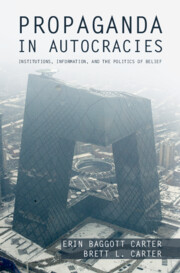Book contents
- Frontmatter
- Dedication
- Epigraph
- Contents
- Figures
- Tables
- Acknowledgments
- Part I Foundations
- 1 Persuasion and Domination
- 2 A Theory of Autocratic Propaganda
- 3 A Global Dataset of Autocratic Propaganda
- Part II The Political Origins of Propaganda Strategies
- 4 The Politics of Pro-regime Propaganda
- 5 Narrating the Domestic
- 6 Narrating the World
- 7 Threatening Citizens with Repression
- Part III The Propaganda Calendar
- 8 The Propagandist’s Dilemma
- 9 Memory and Forgetting
- Part IV Propaganda, Protest, and the Future
- 10 Propaganda and Protest
- 11 Conclusion
- References
- Index
- Other books in the series
1 - Persuasion and Domination
Published online by Cambridge University Press: 18 July 2023
- Frontmatter
- Dedication
- Epigraph
- Contents
- Figures
- Tables
- Acknowledgments
- Part I Foundations
- 1 Persuasion and Domination
- 2 A Theory of Autocratic Propaganda
- 3 A Global Dataset of Autocratic Propaganda
- Part II The Political Origins of Propaganda Strategies
- 4 The Politics of Pro-regime Propaganda
- 5 Narrating the Domestic
- 6 Narrating the World
- 7 Threatening Citizens with Repression
- Part III The Propaganda Calendar
- 8 The Propagandist’s Dilemma
- 9 Memory and Forgetting
- Part IV Propaganda, Protest, and the Future
- 10 Propaganda and Protest
- 11 Conclusion
- References
- Index
- Other books in the series
Summary
“As long as people think that the dictator’s power is secure,” Gordon Tullock wrote, “it is secure.” When citizens think otherwise, all at once, a dictator’s power is anything but, as revealed by the collapse of the Soviet Union and the Arab Spring uprisings. This conviction – that power rests on citizens believing in it – has long compelled the world’s autocrats to invest in sophisticated propaganda apparatuses. This chapter provides an overview of the book. Drawing on the first global dataset of autocratic propaganda, we document dramatic variation in propaganda across autocracies: in coverage of the regime and opposition, narratives about domestic and international life, threats of violence issued to citizens, and the events that shape it. Why do autocrats employ different propaganda strategies? The answer, we argue, is political. Where electoral constraints compel autocrats to seek popular support, their propaganda apparatuses must persuade citizens of regime merits. Where autocrats can fully secure themselves with repression, their propaganda apparatuses aim to make this repressive capacity common knowledge among citizens to discourage mass protests.
- Type
- Chapter
- Information
- Propaganda in AutocraciesInstitutions, Information, and the Politics of Belief, pp. 3 - 38Publisher: Cambridge University PressPrint publication year: 2023



